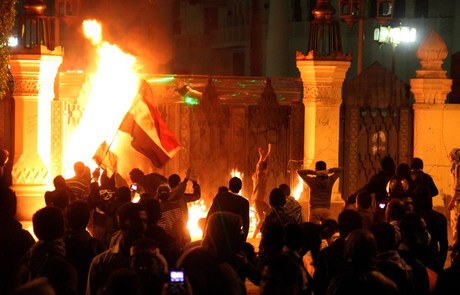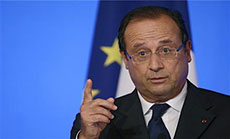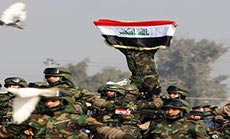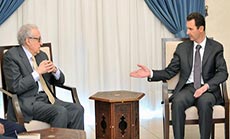
Two Years on Mubarak Fall down: Egyptians Continue Protests

Local Editor
Security forces sprayed protesters with water hoses and tear gas outside the presidential palace as Egyptians marked the second anniversary of the fall of autocrat Hosni Mubarak's with angry demonstrations against his elected successor.
 The forces were trying to disperse a small crowd of protesters on Monday evening, after some of them attempted to cross a barbed wire barrier meant to block them from the palace gate. Some protesters chanted: "The people want to topple the regime." Others threw stones.
The forces were trying to disperse a small crowd of protesters on Monday evening, after some of them attempted to cross a barbed wire barrier meant to block them from the palace gate. Some protesters chanted: "The people want to topple the regime." Others threw stones.
Graffiti scribbled on the palace walls read: "Erhal" or "Leave," the chant that echoed through Cairo's central Tahrir Square during the 18-day uprising that ended with Mubarak stepping down on Feb. 11, 2011.
Earlier, masked men briefly blocked trains at a central Cairo subway station and a dozen other protesters blocked traffic with burning tires on a main overpass in Cairo. Hundreds rallied outside the office of the country's chief prosecutor, demanding justice and retribution for protesters killed in clashes with security forces after President Mohammed Mursi took office last summer.
The protesters lobbed plastic bags filled with red liquid at the prosecutor's office to recall the blood spilled by civilians in clashes with security forces. The prosecutor's appointment by Mursi was criticized as a violation of the judiciary's independence. Another group of protesters locked shut the doors of the main administrative building for state services just outside the subway station at Tahrir Square.
Egypt has been gripped by political turmoil since Mubarak's ouster, in an uprising driven largely by anger over widespread abuse at the hands of state security agencies. Mursi won the first free elections in June.
Protesters are particularly angry over the continued heavy handedness of security services, claiming little has changed since the Mubarak era. Many accuse Mursi and the Brotherhood of trying to monopolize power.
On Monday, government opponents marched to Tahrir Square, the epicenter of the uprising, which has been sealed off by protesters since November. Others went to the presidential palace. Hundreds also marched through the streets of Alexandria, Egypt's second largest city.
"Of course I feel disappointed. Every day it's getting worse," said Ahmed Mohamed, a 20-year-old engineering student protesting outside the presidential palace. "The economy is even worse and all government institutions are collapsing. Mursi won't even acknowledge this."
The protesters are also demanding the amendment of the country's new constitution. They claim that Islamists rushed the charter through the approval process despite disagreement with the opposition. The result, they say, was a charter that undermines freedoms of expression and belief and chips away at women rights.
Some protesters are also demanding a new government, accusing the current government of being ineffective and failing to rein in police abuses or institute economic reforms. One of the most heated issues for protesters remains a lack of accountability for those responsible for the deaths of hundreds of civilians during protests against the state.
Mursi and his supporters have repeatedly dismissed the opposition's charges, accusing the opposition and Mubarak supporters alike of trying to topple a democratically elected president.
Source: News Agencies, Edited by moqawama.org
Comments

France’s Hollande in Qatar for Warplane Deal
9 years ago
Iraq Police Dismantles Al-Qaeda Protest Site
10 years ago
